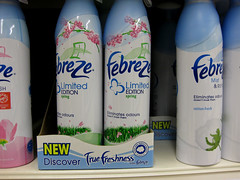 Air fresheners are used in many schools as a means of improving the smell that tends to appear in classrooms that are overcrowded. However, many air fresheners contain chemicals that can irritate the sinuses of children and adults. Could it be possible that an allergic reaction is being misread as ADHD?
Air fresheners are used in many schools as a means of improving the smell that tends to appear in classrooms that are overcrowded. However, many air fresheners contain chemicals that can irritate the sinuses of children and adults. Could it be possible that an allergic reaction is being misread as ADHD?
A study that was presented at the annual scientific meeting of the American College of Allergy, Asthma, and Immunology (ACAAI) this year noted that scented candles and air fresheners can trigger allergy symptoms, can aggravate existing allergies, and can worsen asthma attacks. These same air fresheners are frequently used in classrooms, as well as in homes.
Many fragrances and air fresheners contain volatile organic compounds (VOCs). Some of them include: alcohols, esters (which are formed by condensing and acid with an alcohol), petroleum distillates, limonene, and formaldehyde.
Limonene has a strong smell of oranges. It is often used as a solvent in cleaning products, (which may or may not be used in your child’s classroom). Formaldehyde is, according to the National Toxicology Program (USA), “known to be a human carcinogen”.
Exposure to a VOC can trigger asthma symptoms in children. Exposure to higher concentrations of VOC can cause headaches, dizziness, irritation of the respiratory tract, eye irritation, and memory problems. It can also trigger allergic reactions in kids and adults.
I am someone who suffers from severe allergies. I can assure you that when I am exposed to an allergen, (especially if that exposure lasts over several hours), it makes it very difficult for me to concentrate on whatever task I am trying to accomplish. It makes me much more easily distracted than I would otherwise be.
Prolonged exposure to one of these nasty little air fresheners will aggravate my sinuses, and can cause me to have an asthma attack. If my allergies are really horrible, then I will have problems getting to sleep that night.
Dr. Sherri Singer, Psy.D., Licensed Clinical Psychologist, Attention, Behavior, Processing & Learning Exper,t has a really interesting thought about the potential effect that air fresheners in classrooms have on children. She suggests that, in some cases, what teachers and parents are identifying as ADHD is not ADHD at all.
Instead, it is how a child is reacting to the constant exposure to an air freshener that contains VOCs. In other words, an individual child may be continually off task, may have problems with memory, and may have difficulty completing his or her work in a timely fashion because he or she is dealing with severe sinus irritation from an air freshener. This behavior would look very much like ADHD.
Image by With Associates on Flickr

